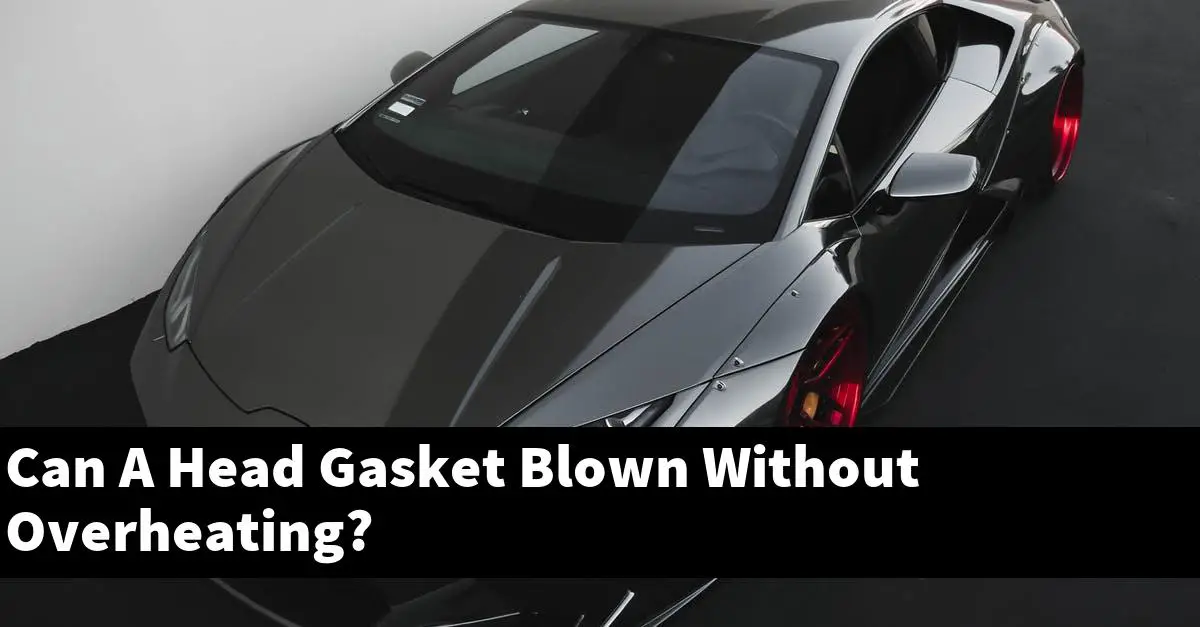Is it possible for a head gasket to blow without the engine overheating?
A head gasket can be blown without overheating if the head gasket is damaged or if there is a problem with the engine.
The article goes on to explore this question in more detail, looking at the symptoms of a blown head gasket and what causes this problem.
Table of Contents
Can a head gasket blow without overheating?
Yes, a head gasket can blow without overheating. This can happen if the gasket is damaged or if the engine is not properly cooled. If the gasket is damaged, it can cause a leak in the engine and allow coolant to enter the combustion chamber.
This can cause the engine to overheat and blow the gasket. If the engine is not properly cooled, the coolant can become too hot and cause the gasket to blow.
What causes a head gasket to blow?
A head gasket is a seal that sits between the engine block and cylinder head in an internal combustion engine. Its job is to seal the cylinders to prevent coolant or oil from leaking into the combustion chamber. Head gaskets can fail for a number of reasons, the most common being overheating.
When an engine overheats, the metal expands and warps, which can cause the head gasket to blow. Other causes of head gasket failure include physical damage (from a collision or engine failure) and manufacturing defects.
How do you know if a head gasket is blown?
If your vehicle overheats regularly or runs hot, this could be a sign that the head gasket is blown. Another symptom of a blown head gasket is white smoke coming from the tailpipe.
If the head gasket is blown, the engine will also likely overheat and the coolant will mix with the oil. This will cause the oil to become thick and milky.
Can a blown head gasket be repaired?
A blown head gasket can often be repaired, depending on the severity of the damage. If the head gasket is only slightly blown, it may be possible to replace just the gasket.
However, if the head gasket is severely blown, it may need to be replaced along with the head. In either case, it is best to consult with a mechanic or automotive specialist to determine the best course of action.
Can you have a blown head gasket with no symptoms?
Yes, it is possible to have a blown head gasket with no symptoms.
The head gasket seals the combustion chamber and keeps the engine’s coolant and oil from mixi
What can mimic a blown head gasket?
There are a few things that can cause symptoms that are similar to a blown head gasket. One possibility is a cracked engine block or cylinder head. This can cause coolant to leak into the cylinders and cause the engine to overheat.
Another possibility is a faulty radiator cap. This can cause the coolant to boil over and cause the engine to overheat. Finally, a clogged radiator can cause the engine to overheat.
How do I know if my Headgasket is cracked or blown?
If you think your head gasket may be cracked or blown, there are a few symptoms to look for. First, check your engine oil. If it is low or dirty, that could be a sign that your head gasket is leaking. You should also check your coolant level and look for any leaks.
If your head gasket is blown, you may also notice engine misfires, overheating, or white smoke coming from the exhaust. If you think your head gasket may be damaged, it’s important to have it checked by a mechanic as soon as possible.
Will my car run hot with a blown head gasket?
A blown head gasket can cause your car to overheat. The head gasket seals the engine block and cylinder head, and prevents coolant and oil from leaking out. If the head gasket is blown, coolant and oil can leak into the combustion chamber, causing the engine to overheat.
Conclusion
It is a common misconception that a head gasket can only be blown if the engine overheats. However, this is not always the case. The head gasket can be blown due to a number of factors, including:
- Excessive wear and tear
- Improper installation
- A manufacturing defect
- A sudden change in temperature
- Excessive pressure
If you suspect that your head gasket may be blown, it is important to have it checked out by a professional as soon as possible. A blown head gasket can lead to a number of serious engine problems, so it is best to nip the problem in the bud before it becomes too serious.


